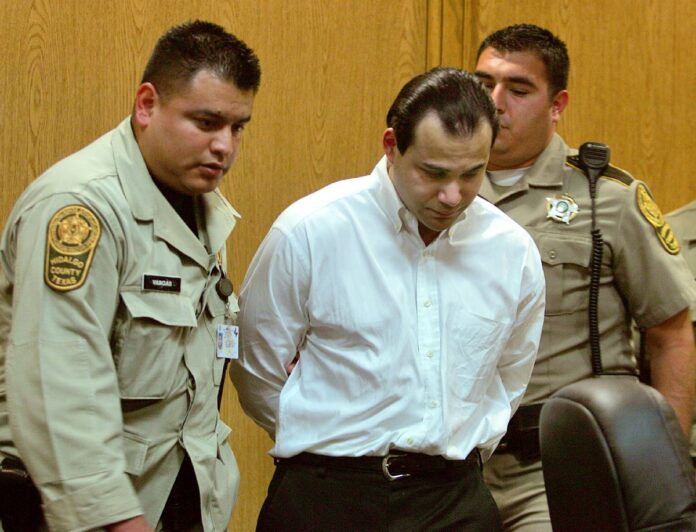
For at least the second time the Texas Court of Criminal Appeals has denied a writ of habeas corpus filed by convicted child killer John Allen Rubio, the Brownsville father found guilty of killing his daughter and two other children of his common-law wife in 2003.
In its ruling the court stated that Rubio failed to satisfy the requirements under Texas law and that his writ was “an abuse of the writ without considering the claims’ merits.”
A jury in 2010 found Rubio guilty in the beheading of Julissa Quesada, 3, John E. Rubio, 14 months and Mary Jane Rubio, 2 months, the three children of his common-law wife Angela Camacho. John Allen fathered Mary Jane, but treated all children as his own.
“The Rubio case continues to be a horrific and painful open wound for the community. It screams for finality. As the Court pointed out this the defendant’s second state writ that the Court has denied. We will now continue working towards having the defendant’s pending federal writ also be denied. The defendant must be held accountable for what he did: murdered and decapitated three innocent children,” Cameron County District Attorney Luis V. Saenz said on Friday.
The Brownsville Herald reached out to Rubio’s attorneys for comment but had not received any replies by Friday evening.
John Allen Rubio admitted to killing his children because he thought they were possessed by the spirit of his dead grandmother, court documents reflect. He and Camacho had discussed burying the childrens’ bodies and fleeing to Mexico, authorities said.
In his writ Rubio alleged the following:
>> State violated his right to equal protection under the Fourteenth Amendment when it pursued the death penalty against him because of is indigent status and based on a public survey.
>> State violated his right to due process under the Fourth Amendment by engaging in a flagrant and ongoing pattern of misconduct.
>> Violated his right to due process when it elicited false and misleading testimony from the guilt phase.
>> Violated his right to due process when it elicited false and misleading testimony during the punishment phase.
>> He had ineffective counsel.
The higher court dismissed these allegations.
The children were smothered, stabbed and mutilated, according to Brownsville police investigators. Their decapitated bodies were stuffed inside trash bags that were found near a bedroom door.
According to a confession Rubio made to police, he admitted to killing the children in 2003 because he believed there was an evil presence in them. He even asked one of the officers first to arrive at the crime scene to place him under arrest, according to the officer’s statement.
Rubio, 40, a Brownsville native, remains on death row at the Polunsky Unit in Livingston, Texas.
Camacho, 41, pleaded guilty to murder in 2005 and was sentenced to life in prison and remains in custody at the Christina Melton Crain Unit in Gatesville. She is eligible for parole March 3, 2043.
The higher court in 2018 rejected the first appeal by Rubio. He has a writ of habeas corpus pending in federal court.
The federal public defender wants Rubio’s case tossed out alleging his appointed defense did not represent him properly and that his case was handled by a district attorney that was steeped in scandal and misconduct, and making these allegations:
>> Rubio’s Sixth Amendment right to counsel was violated because the defense failed to include a mental health expert as a member of the defense team.
>> Rubio’s Sixth Amendment right to counsel was violated because the defense failed to investigate and present evidence about the existence and effects of Fetal Alcohol Spectrum Disorder and Temporal Lobe Epilepsy.
>> Rubio’s Sixth Amendment right to counsel was violated because the defense failed to investigate and prepare for his guilt/innocence phase defense.
>> The State violated Rubio’s right to due process under the Fourteenth Amendment by engaging in a flagrant and ongoing pattern of misconduct.
>> The State violated Rubio’s right to equal protection under the Fourteenth Amendment when it pursued the death penalty against him because of his indigent status and on the basis of a survey.
>> The State violated Napue v Illinois when it elicited testimony that it knew, or should have known, to be false and misleading.
>> Rubio’s Sixth Amendment right to counsel was violated because the defense failed to investigate and present evidence related to Rubio’s mental health during his prior incarceration.
>> The State violated Rubio’s due process rights by eliciting false testimony.
>> The State violated Brady v Maryland by failing to disclose false testimony.
As of Friday, no ruling had been issued in this case.
Rubio’s case has been in state and federal court proceedings for at least 19 years.



